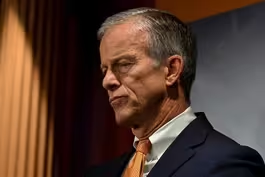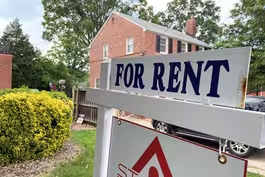
Public transit systems in crisis amid funding shortfalls
Clip: 9/28/2025 | 5m 46sVideo has Closed Captions
Public transit systems ‘on the edge of a cliff’ amid funding shortfalls
A shortfall in federal funding is threatening public transportation systems across the country. As pandemic-era government support runs out and with inflation added to the mix, local governments are saddled with deficits, leading to reduced services and increased fares. Ali Rogin speaks with Philip Plotch, principal researcher and senior fellow at the Eno Center for Transportation, for more.
Problems playing video? | Closed Captioning Feedback
Problems playing video? | Closed Captioning Feedback
Major corporate funding for the PBS News Hour is provided by BDO, BNSF, Consumer Cellular, American Cruise Lines, and Raymond James. Funding for the PBS NewsHour Weekend is provided by...

Public transit systems in crisis amid funding shortfalls
Clip: 9/28/2025 | 5m 46sVideo has Closed Captions
A shortfall in federal funding is threatening public transportation systems across the country. As pandemic-era government support runs out and with inflation added to the mix, local governments are saddled with deficits, leading to reduced services and increased fares. Ali Rogin speaks with Philip Plotch, principal researcher and senior fellow at the Eno Center for Transportation, for more.
Problems playing video? | Closed Captioning Feedback
How to Watch PBS News Hour
PBS News Hour is available to stream on pbs.org and the free PBS App, available on iPhone, Apple TV, Android TV, Android smartphones, Amazon Fire TV, Amazon Fire Tablet, Roku, Samsung Smart TV, and Vizio.
Providing Support for PBS.org
Learn Moreabout PBS online sponsorshipJOHN YANG: A shortfall in federal transportation funding is threatening bus and metro systems across the country.
When ridership dropped during the pandemic, the government spent billions of dollars to support public transit.
But that money has largely run out.
And now with inflation added to the mix, local governments are saddled with hundreds of millions of dollars in deficits.
That's leading to reduced services and increased fares.
Ali Rogin explores the effect all of this is having beyond the morning commute with Philip Plotch, the principal researcher and senior fellow at The Eno Center for Transportation.
ALI ROGIN: Philip Plotch, thank you for joining us.
How did regional public transit systems find themselves at the edge of this financial cliff?
PHILIP PLOTCH, The Eno Center for Transportation: So you might remember when the pandemic first hit, there was a real concern about a potential for a real economic crisis in the United States.
That's why the government, the federal government pumped so much money into the economy.
They lent a lot of money to small businesses.
Money was given to schools, local governments, and about 70 billion with to B went to keep public transportation running across the country.
The thinking was people needed to get jobs, supermarkets and hospitals.
And remember, we wanted all of our frontline workers to get to work.
The programs worked, the economy kept chugging along.
But now many agencies are running out of money because ridership is down.
So compared to what it was before the pandemic, about 14 percent fewer people are taking the bus and about 28 percent fewer people are taking the train.
So the transit agencies, they're making cuts.
They've been stretching out the COVID funding, and they've just been hoping that the state and local governments are going to help bail them out before their money runs out.
That's why many of them are now staring at the edge of a cliff without any good options.
ALI ROGIN: And how is this disrupting the average commuter who is still trying to get to work every day right now?
PHILIP PLOTCH: If you're a transit rider, you might need it to get to a job or a medical appointment, school or grocery store.
You might not be able to get there if you don't have the bus service or the train service, or they're going to be more crowded, or you're going to have to wait longer.
And sometimes the long wait, we're not talking about 10 or 15 minutes.
So imagine you take one bus to another bus and you need a transfer.
If that second bus is only running one every hour, your one hour bus ride could turn into a two-hour bus ride really fast.
If we cut service across the country at transit agencies, it affects people who don't use transit.
So there's more traffic on the roads, it's harder to find parking spaces.
When there's more traffic in a city, it slows down emergency vehicles.
It really hurts everybody.
ALI ROGIN: So let's talk a little bit more about what we saw in Philadelphia.
Sort of a case study in how this is playing out.
What's been happening there and what are the chances that it's going to repeat itself in other cities like San Francisco, Chicago and the like.
PHILIP PLOTCH: So Philadelphia has been staring down a $200 million annual shortfall.
$200 million.
And they put a plan together to cut service, eliminate routes, and to stop service in late evening and early in the morning.
And a judge put it on hold.
So they are going to continue their service.
But what they're doing now is possibly worse.
They're taking money that was set aside from improving their system and now they're using it to keep running the same level of service they had.
So it's sort of like if you set aside money to, let's say, fix up your roof to pay your grocery bills, the water is going to keep seeping into your leaky roof.
It might ruin the ceiling, it might ruin the wiring.
So you can spend $1,000 now to fix up your roof, but it could cost you $30,000 later if you're not taking care of it.
That's going to happen at transit agencies if they start taking the money set aside for upgrading their system to use it just to run their day to day service.
At some point things just break down more often and they're more expensive over the long term and they're not as safe.
So the transit agencies are really trying to avoid what they refer to as a death spiral.
That means they cut service so service is less attractive and fewer people are going to be using it.
And then because fewer people are using it, they have to cut service.
And it's really sad for people who really need to use public transportation.
ALI ROGIN: But this is also happening or has the potential to happen in other cities.
Right?
PHILIP PLOTCH: Some cities have already taken care of this problem.
They've sort of gotten ahead of it.
So Massachusetts recently passed a millionaires tax and money is going to be used for their transit authority up in Boston.
In New Jersey, the state legislature is taking money from the tolls from the New Jersey Turnpike and the Garden State Parkway.
And Minnesota increased their sales tax and their gas tax to pay for more.
But there are places that are really taking a hit.
And San Francisco you mentioned, that's going to be a big problem.
So San Francisco has two things going on.
The Bay Area, a lot more people work from home than any other region.
So there's fewer people.
Also, they relied on their fare.
The BART system, that's the Bay Area Rapid Transit.
They relied about 70 percent of their expenses came from the fares and also from parking fees.
Now because the ridership has plummeted so much, only about 20 percent of their money is coming in.
So they really have to look for the local and state governments for help.
So it's really -- it's different.
Every, every city is different.
Pittsburgh is facing a big problem while other places aren't necessarily going through that same thing.
ALI ROGIN: Philip Plotch with The Eno Center for Transportation, thank you so much.
PHILIP PLOTCH: And thank you for informing all of your listener.
Federal workers fear layoffs as government shutdown looms
Video has Closed Captions
Clip: 9/28/2025 | 5m 49s | Federal workers brace for more mass layoffs as potential government shutdown looms (5m 49s)
Jahri’s World creator makes music for neurodivergent kids
Video has Closed Captions
Clip: 9/28/2025 | 3m 49s | Jahri’s World creator reflects on why he makes music for neurodivergent kids (3m 49s)
Why renters are on the rise in the suburbs of major cities
Video has Closed Captions
Clip: 9/28/2025 | 4m 59s | Why renters are increasingly outnumbering homeowners in the suburbs of major cities (4m 59s)
Providing Support for PBS.org
Learn Moreabout PBS online sponsorship
- News and Public Affairs

FRONTLINE is investigative journalism that questions, explains and changes our world.

- News and Public Affairs

Amanpour and Company features conversations with leaders and decision makers.












Support for PBS provided by:
Major corporate funding for the PBS News Hour is provided by BDO, BNSF, Consumer Cellular, American Cruise Lines, and Raymond James. Funding for the PBS NewsHour Weekend is provided by...


